[Big read] No cross-strait policy to appease all parties in Taiwan's presidential race
As the Taiwan presidential election day nears, Lianhe Zaobao journalist Miao Zong-Han takes a look at the three presidential hopefuls, their stances and how the voters are responding. Meanwhile, cross-strait tensions will be high even after the election results, as major powers will attempt to influence the content of the new president's inaugural address.

On 24 November, the last day for the registration of presidential candidates for Taiwan's 2024 election, the Blue-White alliance between the two opposition parties officially fell apart. A three-way electoral battle between the Blue, Green and White parties has taken shape.
As the election heats up, each side has fervently announced their cross-strait policy, national views, visions and so forth - the issue of how to maintain peace in the Taiwan Strait is a "mandatory question" and has also become a point of contention.
Lai: choice between democracy and dictatorship
William Lai, incumbent vice-president and presidential candidate for the Democratic Progressive Party (DPP), declared in June that he would continue with the Tsai Ing-wen administration's cross-strait policy, that is to preserve a free and democratic constitutional system, insist that the sovereignty of the Republic of China (ROC) and the People's Republic of China (PRC) are not subordinate to each other, resist annexation or encroachment on Taiwan's sovereignty, and that the future of the ROC must be decided by the Taiwanese people.
He advocated for enhancing Taiwan's deterrence, strengthening economic security, deepening democratic partnerships, and maintaining steady and principled cross-strait leadership in order to safeguard peace and stability across the Taiwan Strait.
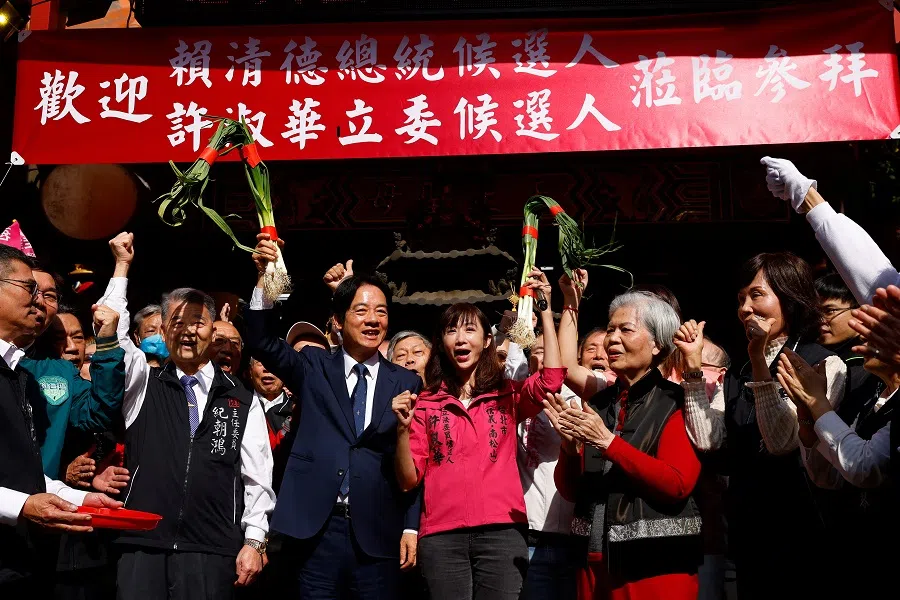
Also, Lai has often framed next year's presidential election as "a choice between democracy and dictatorship", emphasising that only when there is sovereignty is there true peace, and to give up sovereignty is not true peace - to accept the "one China" principle and the 1992 Consensus is to give up sovereignty. But he also stressed that if he is elected, he is willing to have exchanges and cooperate with the mainland on the basis of reciprocity and dignity.
Hou: choice between war and peace
As opposed to Lai's "choice between democracy and dictatorship" narrative, Hou You-yi, presidential candidate for the Kuomintang (KMT), described this election as "choosing between war and peace". He emphasised that cross-strait peace is the foundation for economic development, and if he is elected he would renegotiate the Economic Cooperation Framework Agreement, including agreements on services and trading of goods, ensuring the investment interests of Taiwanese entrepreneurs as well as a large-scale opening up of the job market for mainland students to seek employment in Taiwan.
On his cross-strait relations position, Hou stated during an interview with Taiwanese media in July that he accepts the 1992 Consensus that is in line with the Constitution of the ROC, advocating the political reality whereby neither side recognises the other's sovereignty nor denies their administrative rights. He stressed that he rejects both the "one country, two systems" interpretation of the 1992 Consensus, and President Tsai's stigmatised version of the 1992 Consensus.
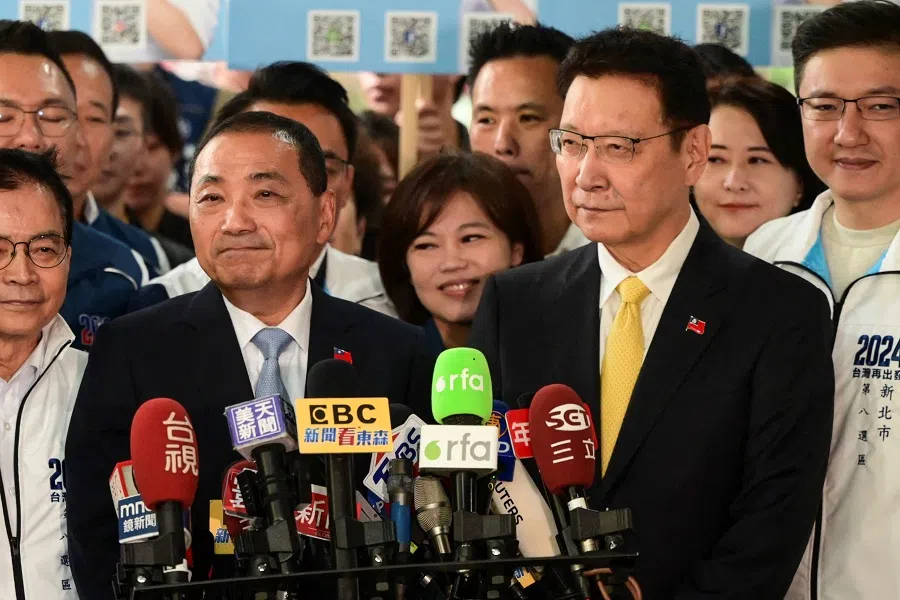
However, looking through public records, Hou has avoided using the phrase "one China" principle (一个中国原则), as well as the oft-used "one China, different interpretations" (一中各表) long employed by the KMT since the Ma Yin-jeou administration.
As for how to deal with conflict in the Taiwan Strait, during Hou's visit to the US in September, he outlined his "3Ds strategy": deterrence, dialogue and de-escalation.
... as opposed to supporters of the Green camp, the supporters of Hou and Ko did not place as much emphasis on cross-strait policy.
Ko: ambiguous stance
Compared with the two major Blue and Green parties, Taiwan People's Party presidential candidate Ko Wen-je has a rather ambiguous rhetoric for his cross-strait position. He described cross-strait relations as "special relations" (特殊关系) while basing his cross-strait exchange on the two-pronged approach of deterrence and communication.
As for restarting cross-strait trade negotiations, Ko advocated first and foremost passing the Cross-Strait Agreement Supervisory Act to put in place a set of standard operating procedures, before talking about the trading of goods, and lastly, services.
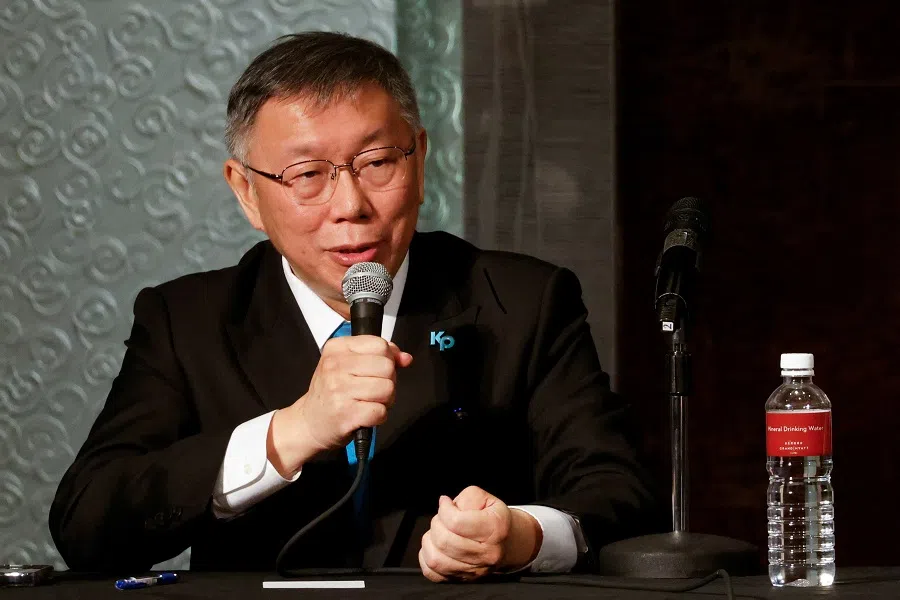
However, when interviewed by Taiwanese media on 6 December, Ko suddenly said that he would continue in the direction of Tsai's foreign and defence policies, stressing that deep down, his nature is "still deep-Green", and there is a chance that Taiwan can become a normal country if he is elected.
Cross-strait policy not top priority for some Blue, White supporters
Lianhe Zaobao interviewed supporters of the three political parties on the cross-strait policy of the presidential candidates, and discovered that as opposed to supporters of the Green camp, the supporters of Hou and Ko did not place as much emphasis on cross-strait policy. Instead, their primary voting concerns were domestic political matters.
Lan, a 56-year-old senior manager at an infocommunications company in Taipei, shared that she would be voting for the KMT candidate in the upcoming elections as she had done in the past. However, when asked about her thoughts on cross-strait relations, as a second-generation waishengren (外省人, mainlanders who migrated to Taiwan after the end of WWII in 1945 and largely after the Chinese Civil War in 1949), she answered without hesitation, "I agree that both sides of the strait are not subordinate to each other. It's been more than 70 years! To say that we still belong to one country is totally unrealistic."
She emphasised that cross-strait policy would not be her main voting concern, adding that "after all, no one would be able to make fundamental changes in the short term". Instead, it is the spate of corruption issues in the eight years of DPP governance that left her unsatisfied, and thinking there must be a rotation of political parties to achieve checks and balances.
She opined that between the Blue and White camps, the KMT has a better chance of winning the DPP, and thus the pairing of Hou and Chao Shao-kang has her vote even though she is not satisfied with them.
Evan (pseudonym), a 26-year-old working in the legal sector in Taipei, will vote for Ko in the 2024 presidential election despite voting for Tsai in 2020.
He stated that the switch is because the DPP has grappled with the same issue of black money over the past four years, and he felt that Taiwan's political arena must change from the traditional two-party structure. He said, "Cross-strait policy would not impact which party I vote for, but it would surely deter me from voting for the KMT."
Hao decided to return to Taiwan to vote only after Lai confirmed Hsiao Bi-khim as running mate. He joked that his vote was not for Lai but for Hsiao.
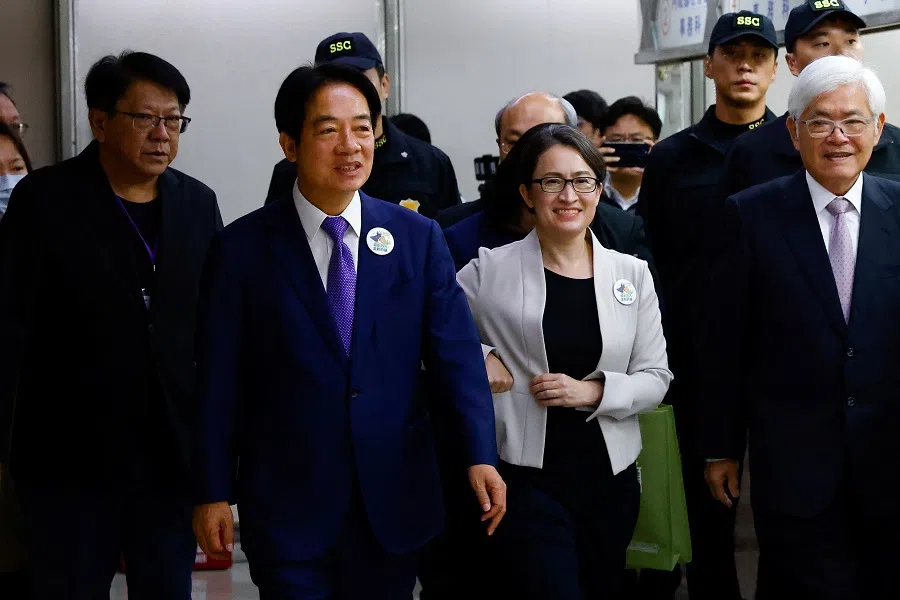
Hao Hao, a 33-year-old Taiwanese engineer working in Japan who had voted for Tsai in the last two elections, stressed that he would never vote for a party that advocates reunification.
He also said that he was hesitant about returning to Taiwan to vote this time around due to Lai's conservative stance in the past on the issue of sexuality. Hao decided to return to Taiwan to vote only after Lai confirmed Hsiao Bi-khim as running mate. He joked that his vote was not for Lai but for Hsiao.
DPP in the lead
Shen Yu-chung, a professor at the department of political science at Tunghai University in Taiwan, told Lianhe Zaobao that from the three presidential candidates' rhetoric, it is apparent that Ko intentionally wants to downplay the issue of cross-strait positioning. Meanwhile, the major Blue and Green parties each have a cross-strait policy that is relatively comprehensive when it comes to national vision and positioning.
Shen said that the DPP should take into account how to ensure that the majority of the Taiwanese public supports its cross-strait policy discourse while drafting its language to avoid coming across as too antagonistic towards mainland China. Even though the KMT has no issue with the latter, it is an even more complicated challenge to win over people outside of their base supporters to buy into the discourse that the genesis of the ROC was from the 1911 "Greater China" narrative. For many Taiwanese, this is no longer a part of their life experiences.
Taiwanese people believe that tensions in the Taiwan Strait are rising, but the risks remain within control, which is why Lai is able to maintain his lead in the polls.
Although Lai is leading in various polls, a poll released by ETtoday (ETtoday民调云) in early December showed that 57.4% of respondents think that the outcome of the elections next year will affect whether cross-strait relations are headed towards peace or war. Furthermore, 49.5% of respondents even think that cross-strait relations will worsen if Lai is elected as president.
Shen pointed out that various polls on presidential approval ratings and cross-strait risk assessments showed that Taiwanese people believe that tensions in the Taiwan Strait are rising, but the risks remain within control, which is why Lai is able to maintain his lead in the polls.
Beijing to strengthen deterrence against secessionists
Since Beijing launched military drills around Taiwan following then US House Speaker Nancy Pelosi's visit to the island in August last year, Beijing has continued to express dissatisfaction towards official interactions between the US and Taiwan through military actions.
For example, when Tsai transited in California to meet with then US House Speaker Kevin McCarthy in April, and when Lai transited through the US in August, mainland China's People's Liberation Army held military drills around Taiwan on both occasions, sending strong warning signals.
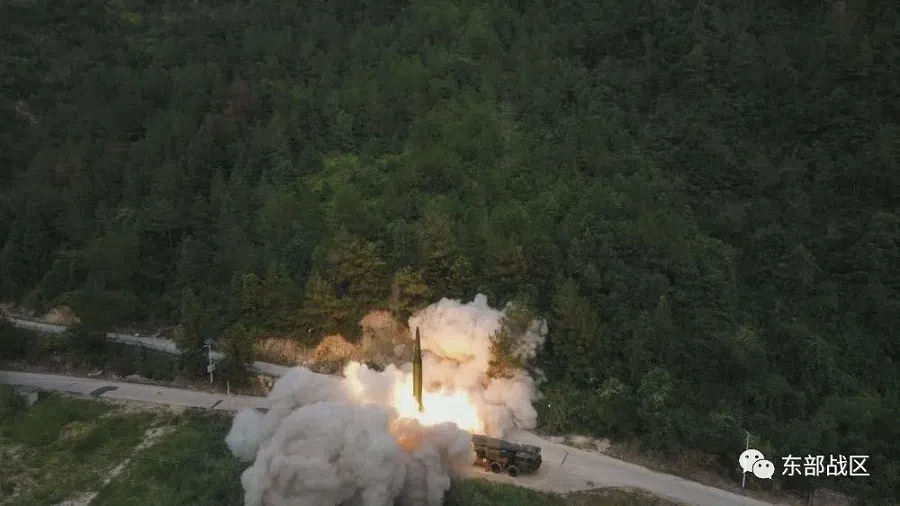
In a press release issued in August, the mainland's Taiwan Affairs Office attacked Lai as a "worker for 'Taiwan independence'" and a "troublemaker" who would push Taiwan towards the brink of war. This shows that the mainland's positioning of Lai is clear.
Ni Yongjie, director of the Shanghai Institute of Taiwan Studies, said in an interview that although Lai is intentionally downplaying his firm stance on "Taiwan independence", the essence remains the same. Thus, he believes that the mainland must stay vigilant and be prepared to strengthen its warnings to stop secessionist activities.
He said that the mainland will be well prepared regardless of who wins the Taiwan elections. If the Blue camp wins, consultations on both sides of the Taiwan Strait will soon resume based on the foundation of the 1992 Consensus. If Lai becomes president, the mainland will also make hierarchical and stratified controls based on his response to truly destroy "Taiwan independence" secessionist forces.
Li Zhenguang, deputy head of the Institute of Taiwan Studies at Beijing Union University, also told Lianhe Zaobao that the mainland's moves are dependent on Lai's words and actions. But it must be noted that Lai is stubborn and refers to himself as a "pragmatic worker for Taiwan independence"; if he embarks on "Taiwan independence" and challenges the bottom line of stability in cross-strait relations, cross-strait relations will likely face a wave of intense conflict.
... if there is no change to the ruling party after the election, Beijing could, on the foundation of "extreme thinking" (极限思维), make hard-handed moves including highly targeted shows of force in the time between when the votes come in and the president's inauguration. - Chieh Chung, Associate Research Fellow, National Policy Foundation
Tense cross-strait relations expected
The Institute of International Relations at National Chengchi University, the Institute for National Defense and Security Research and other think tanks recently conducted several seminars, inviting experts and academics to analyse the impact of the upcoming elections on the Taiwan Strait situation.
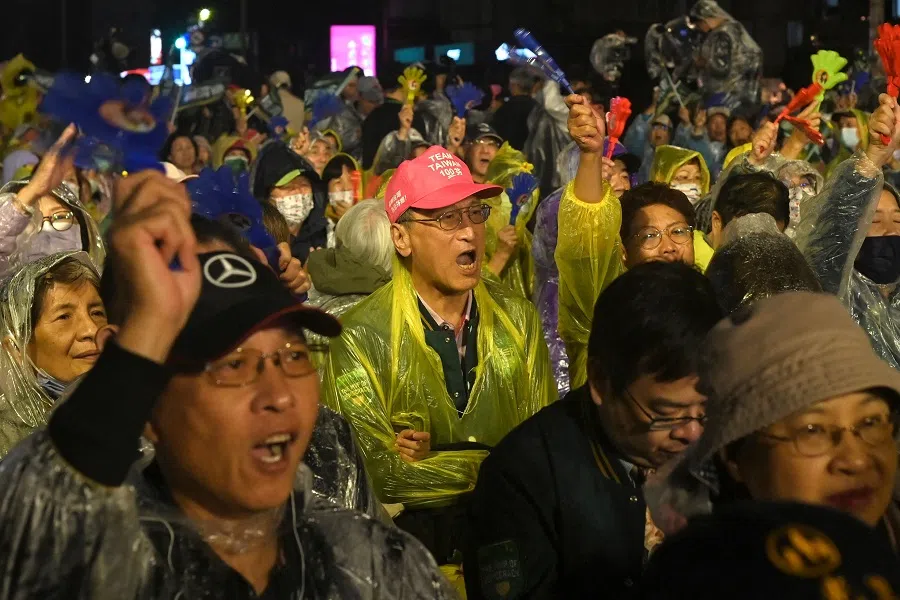
Chang Wu-ueh, director of Tamkang University's Center for Cross-Strait Relations, assessed that Beijing does not wish to see the DPP win the presidency and maintain its legislative majority. If the Green camp maintains its rule, tense cross-strait relations will persist from January next year to 20 May.
He thinks that the following events should be closely watched: the mainland's response to Taiwan's presidential election outcome on 13 January; the 2024 Taiwan Work Conference; the third plenary session of the Chinese Communist Party's 20th Central Committee; the mainland's Two Sessions in March, which could include important speeches and new laws; and the mainland's response when the new Taiwan president is inaugurated on 20 May.
Chieh Chung (揭仲), associate research fellow at the National Policy Foundation, said that if there is no change to the ruling party after the election, Beijing could, on the foundation of "extreme thinking" (极限思维), make hard-handed moves including highly targeted shows of force in the time between when the votes come in and the president's inauguration.
He thinks that Beijing will use this to deter the new government from taking further actions that would challenge Beijing's bottom line, as well as attempt to influence the content of the new president's inaugural address. At the same time, it will urge Washington to make its stance clear and commit to restraining the new Taiwan government on issues of concern to Beijing.
... regardless of the model chosen, cross-strait economic and trade cooperation will be substantially weakened. - Wu Chia-Hsuan, Deputy Director, First Research Division, Chung-Hua Institution for Economic Research in Taiwan
Additionally, the mainland is also expected to extend the investigation into the Taiwan authorities' trade restrictions until 12 January 2024. The anti-dumping probe into Taiwan polycarbonate imports will also be extended until 29 May next year. The two dates are close to the Taiwan presidential election and the inauguration of Taiwan's new president respectively.
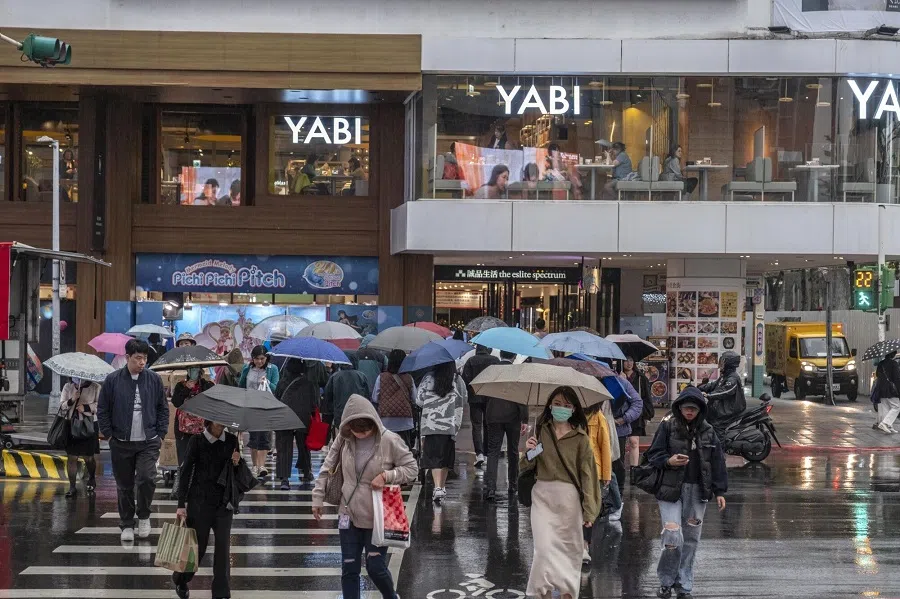
Wu Chia-Hsuan, deputy director of the First Research Division at the Chung-Hua Institution for Economic Research in Taiwan, assessed that in the short term, if the political atmosphere of both sides of the Taiwan Strait remains unchanged after the Taiwan presidential election, cross-strait economic and trade relations will most certainly continue to cool down. In the long term, a key factor affecting the development of cross-strait economic and trade ties lies in the dynamics of China-US relations.
She said that with China and the US both strengthening technological independence and local supply chains, Taiwan businesses can only integrate with mainland Chinese-funded enterprises to enter the mainland market. Otherwise, they would have to quickly shift their production bases, disperse their target markets and distance themselves from the mainland's supply chain.
Wu thinks that regardless of the model chosen, cross-strait economic and trade cooperation will be substantially weakened. The accelerated diversion of cross-strait economic and trade cooperation has already become an important trend.
China and US may intend to manage 'Taiwan independence' together
Apart from experts on cross-strait relations, American academics are paying attention to the Taiwan elections as well. Three influential academics, Bonnie S. Glaser, managing director of the Indo-Pacific Program at the German Marshall Fund; Cornell University professor Jessica Chen Weiss; and Columbia University professor Thomas Christensen, jointly wrote a commentary in Foreign Affairs on 30 November titled "Taiwan and the True Sources of Deterrence", prompting Taiwanese media outlets to publish excerpts focusing on urging Lai to consider "suspend[ing] the independence clause in the 1991 party charter".
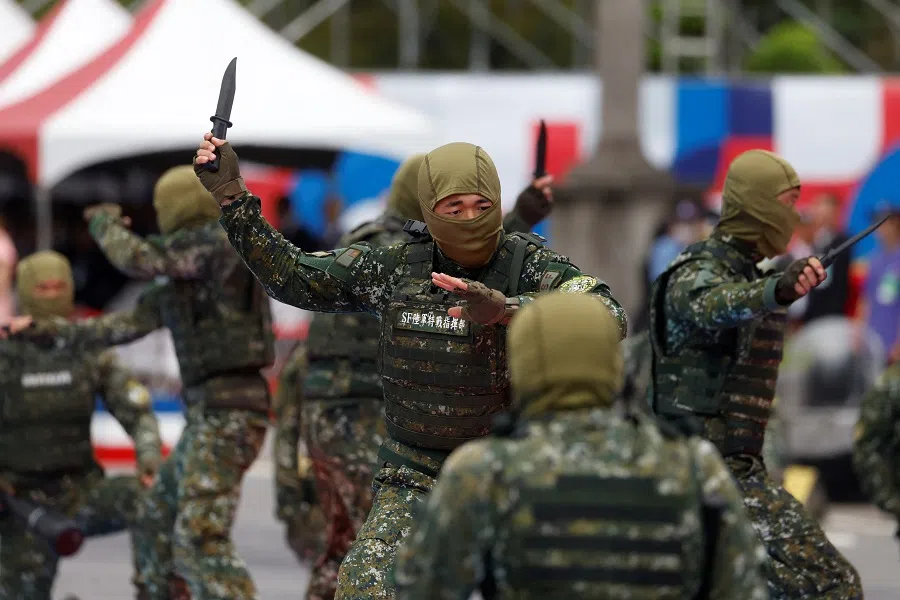
However, Glaser later posted on X (formerly Twitter) on 2 December: "It is regretful that the views expressed by me and my co-authors in Foreign Affairs are being taken out of context by some people in Taiwan. The main point of the article is that effective deterrence requires both credible threats and assurances."
In terms of US influence on the situation in the Taiwan Strait, Tamkang University's Chang thinks that the "big cross-strait" in the Pacific Ocean is highly restraining the "small cross-strait" in the Taiwan Strait; as long as the "big cross-strait" does not get out of control, there will be no dramatic changes on both sides of the Taiwan Strait.
He also mentioned that while it is difficult for both China and the US to jointly advance reunification, there are channels where both sides can control and manage "Taiwan independence" and prevent conflicts.
But if someone like former US President Donald Trump takes office, the situation will become more dangerous. - Ni Yongjie, Director, Shanghai Institute of Taiwan Studies
Meanwhile, Beijing Union University's Li thinks that the effective management of "Taiwan independence" on the island is an urgent task facing China and the US today - if Lai wins the election, the risks it would bring to the Taiwan Strait could be even higher than the former Chen Shui-bian administration.
Shanghai Institute of Taiwan Studies' Ni also mentioned that although he does not expect the US's Joe Biden administration to soften its stance on the Taiwan Strait issue, high-level communication channels between China and the Biden administration still exist. Even in the worst-case scenario, the situation will be more controllable than if the Republican Party were in power. But if someone like former US President Donald Trump takes office, the situation will become more dangerous.
This article was first published in Lianhe Zaobao as "蓝绿白"两岸牌" 谁能赢民心?".



![[Big read] When the Arctic opens, what happens to Singapore?](https://cassette.sphdigital.com.sg/image/thinkchina/da65edebca34645c711c55e83e9877109b3c53847ebb1305573974651df1d13a)

![[Video] George Yeo: America’s deep pain — and why China won’t colonise](https://cassette.sphdigital.com.sg/image/thinkchina/15083e45d96c12390bdea6af2daf19fd9fcd875aa44a0f92796f34e3dad561cc)